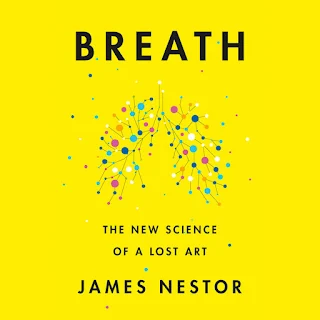"The missing pillar in health is breath. It all starts there."With that kind of statement, I was an eager student, ready to learn. The first third of the book was the most informative and interesting in my opinion. I learned that the way in which we breathe and what we put into our mouths greatly influences the formation of our jaws and teeth.
Those who breathe through their mouths are more likely to suffer from a whole host of health-related problems, while the importance of eating a variety of foods that include chewing and crunching can greatly impact the formation of the jaw, teeth and facial structure.
I enjoyed the author's mention of visiting the ossuary in the Paris catacombs as he discussed the dental health of the dead. He noted that with the introduction of highly processed foods, humans suffer more now from crowded teeth and small jaws which shrinks our mouths and affects our breathing. This brought to mind a book I read in May 2017 entitled Built on Bones - 15,000 Years of Urban Life and Death by archaeologist Brenna Hassett which made this case with more science and evidence to back it up.
The author himself suffers from dental and breathing problems and underwent an experiment where he and a colleague taped their noses shut for an extended period of time which forced them to breathe through their mouths. However, you'll need to read the book to find out what happened.
In the author's words:
"This book is a scientific adventure into the lost art and science of breathing."
However, I'd lost interest by the time I reached the sections on breathing practices like Pranayama and the exercises towards the end of the book were uninspiring. Instead, my key takeaways were from the beginning of the book and now when I see a young child sucking their thumb or putting safety blankets in their mouths, I worry for their development.
James Nestor narrated the audiobook himself, however for reasons unknown, puts on a completely different voice when quoting other researchers or people throughout the text. Unfortunately I found this incredibly distracting and it considerably detracted from my enjoyment of the book.
I did enjoy the anecdotal evidence, but Breath is by no means a medical book. Nestor is a journalist, not a medical professional or a scientist, so readers do need to keep this in mind.
Breath - The New Science of a Lost Art by James Nestor is recommended reading for all parents (even if you just read the first half of the book), anyone suffering from dental difficulties and naturally anyone experiencing breathing problems, like asthma, snoring or sleep apnea.
James Nestor narrated the audiobook himself, however for reasons unknown, puts on a completely different voice when quoting other researchers or people throughout the text. Unfortunately I found this incredibly distracting and it considerably detracted from my enjoyment of the book.
I did enjoy the anecdotal evidence, but Breath is by no means a medical book. Nestor is a journalist, not a medical professional or a scientist, so readers do need to keep this in mind.
Breath - The New Science of a Lost Art by James Nestor is recommended reading for all parents (even if you just read the first half of the book), anyone suffering from dental difficulties and naturally anyone experiencing breathing problems, like asthma, snoring or sleep apnea.




































Sorry to hear it got a little tedious! I think you make a good point there of remembering the author is a journalist, not a scientist. A vital difference with this kind of book, I think!
ReplyDeleteIt's hard to find that balance isn't it? An author who has the scientific or medical background might not be able to present the information in a readable format. Whilst a journalist writes well for an audience, but doesn't delve into the science enough for the reader's liking. Tough one.
DeleteWell it wont be on my reading list, but thanks for sharing your thoughts
ReplyDeleteThanks Shelleyrae, it fits the disease criteria of your non fiction reading challenge at least.
DeleteI thought I'd like this one more than I did.
ReplyDeleteMe too Deb, I hope you managed to get a few insights from it.
Delete